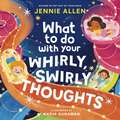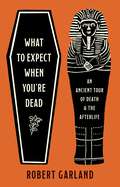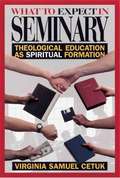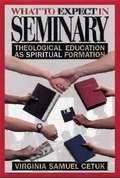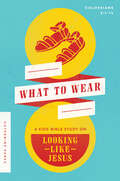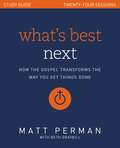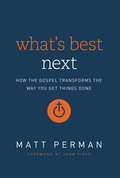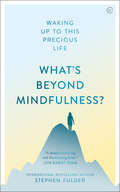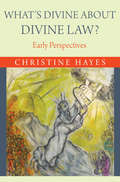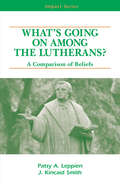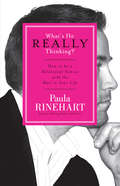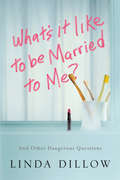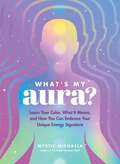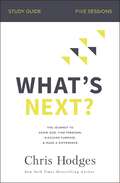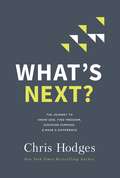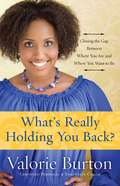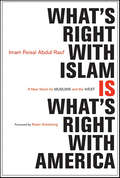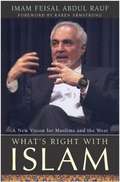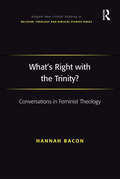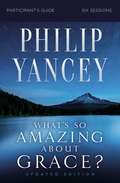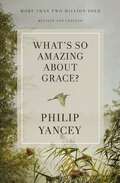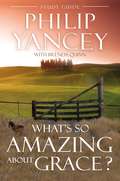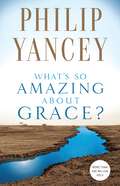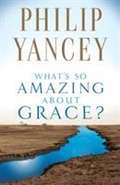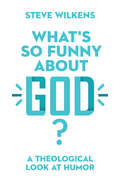- Table View
- List View
What to Do with Your Whirly, Swirly Thoughts
by Jennie AllenDo your children know they are the boss of their thoughts? New York Times bestselling author Jennie Allen will help your kids realize that they don&’t have to hang on to every scary, anxious, or mean thought that enters their heads (no matter how it gets there). Based on biblical advice to take thoughts captive, this picture book makes managing thoughts achievable and fun for kids.As a mother of four and bestselling author of Get Out of Your Head, Jennie Allen knows what it&’s like to swirl in a spiral of thoughts, but she also knows we don&’t have to stay stuck in toxic thinking patterns—and she wants to pass on this liberating truth to the next generation.A great gift for teachers, caregivers, or back-to-school celebrations, What to Do with Your Whirly, Swirly Thoughts is a wonderful tool to teach your children thatGod created them and their amazing brains with a plan and a purpose, and He wants to help them use their thoughts and brains for good;God has given them power over their thoughts; andeven if they&’ve been stuck in a swirl of anxious, scary thoughts, they don&’t have to stay there!With whimsical illustrations from Nadia Gunawan, this picture book addresses one of the most foundational skills for a happy, healthy life. Surround your children with your love and with tools to combat anxiety and negative thinking.
What to Expect When You're Dead: An Ancient Tour of Death and the Afterlife
by Robert GarlandAn entertaining and enlightening book about how ancient peoples dealt with death—and what we might learn from themA lively story of death, What to Expect When You&’re Dead explores the fascinating death-related beliefs and practices of a wide range of ancient cultures and traditions—Mesopotamian, Egyptian, Hindu, Jewish, Zoroastrian, Etruscan, Greek, Roman, Early Christian, and Islamic. By drawing on the latest scholarship on ancient archaeology, art, literature, and funerary inscriptions, Robert Garland invites readers to put themselves in the sandals of ancient peoples and to imagine their mental state moment by moment as they sought—in ways that turn out to be remarkably similar to ours—to assist the dead on their journey to the next world and to understand life&’s greatest mystery.What to Expect When You&’re Dead chronicles the ways ancient peoples answered questions such as: How to achieve a good death and afterlife? What&’s the best way to dispose of a body? Do the dead face a postmortem judgement—and where do they end up? Do the dead have bodies in the afterlife—and can they eat, drink, and have sex? And what can the living do to stay on good terms with the nonliving?Filled with intriguing stories and frequent humor, What to Expect When You&’re Dead will be a morbidly delicious treat for every reader alive.
What to Expect in Seminary: Theological Education as Spiritual Formation
by Virginia S. CetukIn What to Expect in Seminary, Virginia Samuel Cetuk looks at the various facets of theological education -- the call to ministry, classroom learning, community life, field education, financial realities, time-management challenges -- through the lens of spiritual formation. In each chapter she challenges readers to view the particular topic as an avenue to spiritual growth instead of as an obstacle to the same. Offering readers the conceptual tool of reframing, she draws upon psychology, Scripture, and her many years' experiences in theological education to help readers see both the challenges and the rich opportunities of theological education related to ministry and spiritual formation.
What to Expect in Seminary: Theological Education as Spiritual Formation
by Virginia Samuel CetukAnyone who is thinking about a career in pulpit ministry will want to read this book. It explores the challenges and needs of becoming and then serving as a pastor.
What to Wear: A Kids Bible Study on Looking Like Jesus (Colossians 3:1-14)
by Catherine ParksHelping kids fall in love with God and His Word as they study the Bible for themselves.What to Wear is your kids&’ journey into their truest identity—Jesus Christ!The Apostle Paul tells us that our identity is in Christ, and we need to dress the part. All who follow Jesus—kids included—must take off and put on certain things. What to Wear is an eight-part study of these items of &“clothing&” Paul teaches about in Colossians 3. How do we put on compassion, kindness, humility, meekness, patience, forbearance, forgiveness, and love?This study shows your kids how Jesus perfectly embodies these virtues and how He enables us to grow in them. Apart from Jesus Christ, our attempts to form these traits in our children will fail. Yet when tied to identity in Christ and our belonging in the church, we see the fruit of these qualities developed in our minds and hearts.Kids are encouraged to learn algebra, science, instruments, and athletics. The goal of this study is to help our kids live into their calling to know and love Jesus by studying His Word. In this study, kids will learn the method of observation, interpretation, and application. As kids learn how to read the Bible for themselves, they&’ll also grow to delight in God&’s Word.What to Wear provides the encouragement and guidance needed for your kids journey into looking like Jesus!
What's Best Next Study Guide: How the Gospel Transforms the Way You Get Things Done
by Matt PermanBy anchoring your understanding of productivity in God's plan, the What's Best Next Study Guide gives your study group or class a practical approach for increasing effectiveness in work and life.There are a lot of myths about productivity--what it means to get things done and how to accomplish work that really matters. In our current era of innovation and information overload, it may feel harder than ever to understand the meaning of work or to have a sense of vocation or calling.So how do you get more of the right things done without confusing mere activity for actual productivity?Matt Perman has spent his career helping people learn how to do work in a gospel-centered and effective way. What's Best Next explains his approach to unlocking productivity and fulfillment in work by showing how faith relates to work, even in our everyday grind.The What's Best Next Study Guide, a companion to What's Best Next and the What's Best Next Video Study, offers a practical approach for improving productivity in all areas of life. It will help you better understand:How to create a mission statement for your life that's actually practicable.How to delegate to people in a way that really empowers them.How to overcome time killers like procrastination, interruptions, and multitasking by turning them around and making them work for you.How to process workflow efficiently and get your email inbox to zero every day.How to have peace of mind without needing to have everything under control.How generosity is actually the key to unlocking productivity.This twenty-four session study guide includes:Reflection questions for group and personal studyVideo teaching notesFrequent Bible references and quotes from Christian thinkersAmple space for notetakingClosing prayers at the end of each sessionProductivity isn't just about getting more things done. It's about getting the right things done--the things that count, make a difference, and move the world forward. You can learn how to do work that matters and how to do it well.
What's Best Next: How the Gospel Transforms the Way You Get Things Done
by John Piper Matthew Aaron PermanDo Work That Matters Productivity isn’t just about getting more things done. It’s about getting the right things done—the things that count, make a difference, and move the world forward. In our current era of massive overload, this is harder than ever before. So how do you get more of the right things done without confusing mere activity for actual productivity? When we take God’s purposes into account, a revolutionary insight emerges. Surprisingly, we see that the way to be productive is to put others first—to make the welfare of other people our motive and criteria in determining what to do (what’s best next). As both the Scriptures and the best business thinkers show, generosity is the key to unlocking our productivity. It is also the key to finding meaning and fulfillment in our work. What’s Best Next offers a practical approach for improving your productivity in all areas of life. It will help you better understand: • Why good works are not just rare and special things like going to Africa, but anything you do in faith even tying your shoes. • How to create a mission statement for your life that actually works. • How to delegate to people in a way that actually empowers them. • How to overcome time killers like procrastination, interruptions, and multitasking by turning them around and making them work for you. • How to process workflow efficiently and get your email inbox to zero every day. • How your work and life can transform the world socially, economically, and spiritually, and connect to God’s global purposes. By anchoring your understanding of productivity in God’s purposes and plan, What’s Best Next will give you a practical approach for increasing your effectiveness in everything you do.
What's Beyond Mindfulness?: Waking Up to This Precious Life
by Stephen FulderA life-changing guide to the incredible benefits of living with a radical, hopeful and dharma (Buddhist practice)-based perspective that includes mindfulness but goes way beyond it. A uniquely practical and accessible exploration of Buddhism in everyday life that will have appeal to people of any faith and of none."A deeply nurturing and illuminating book." - Jon Kabat-Zinn If mindfulness is the gate to the awakened life, this book describes the garden that lies beyond: a magical, rich and fulfilled way of living that comes when we act according to Buddhist principles. Mindfulness - or the practice of paying attention to the present moment - is a part of this, but only one part. This book reveals exactly how radical, exciting and life-changing the full picture of Buddhist ideas about concepts such as compassion, joy, detachment and liberation can be. Its key aim, however, is to do this in a way that appeals to everyone, whether they are interested in Buddhism or not. Written in simple, straightforward language, the book contains 50 essays covering every aspect of modern life, ranging from the mundane to the spiritual. Topics include how to be fulfilled at work, how to relate to money, what mindfulness really means, how to find the magic of the moment, what being authentic means, how to age wisely, how to be friends with your own body, how to step off the treadmill of daily life, what the concepts of emptiness, unity and enlightenment really mean ... and much, much more. This book will imbue your life once more with the sense of magic and mystery that you felt as a child; it will allow you to put down the burdens of anxiety, joylessness, restlessness or a judging mind - it will do all this by enabling you to shift your experience of the world in a truly profound way.
What's Divine about Divine Law?
by Christine HayesIn the thousand years before the rise of Islam, two radically diverse conceptions of what it means to say that a law is divine confronted one another with a force that reverberates to the present. What's Divine about Divine Law? untangles the classical and biblical roots of the Western idea of divine law and shows how early adherents to biblical tradition--Hellenistic Jewish writers such as Philo, the community at Qumran, Paul, and the talmudic rabbis--struggled to make sense of this conflicting legacy.Christine Hayes shows that for the ancient Greeks, divine law was divine by virtue of its inherent qualities of intrinsic rationality, truth, universality, and immutability, while for the biblical authors, divine law was divine because it was grounded in revelation with no presumption of rationality, conformity to truth, universality, or immutability. Hayes describes the collision of these opposing conceptions in the Hellenistic period, and details competing attempts to resolve the resulting cognitive dissonance. She shows how Second Temple and Hellenistic Jewish writers, from the author of 1 Enoch to Philo of Alexandria, were engaged in a common project of bridging the gulf between classical and biblical notions of divine law, while Paul, in his letters to the early Christian church, sought to widen it. Hayes then delves into the literature of classical rabbinic Judaism to reveal how the talmudic rabbis took a third and scandalous path, insisting on a construction of divine law intentionally at odds with the Greco-Roman and Pauline conceptions that would come to dominate the Christianized West.A stunning achievement in intellectual history, What's Divine about Divine Law? sheds critical light on an ancient debate that would shape foundational Western thought, and that continues to inform contemporary views about the nature and purpose of law and the nature and authority of Scripture.
What's Going on Among the Lutherans?: A Comparison of Beliefs (Impact Series)
by Patsy A Leppien J. Kincaid SmithWhat do Lutherans believe?You might have heard the word “Lutheran” before, and you might know that the Lutheran church in North America is divided into various church bodies. Why is that? Do they all believe the same thing?If not, what are the differences that make them unique—and why does it matter?The book What’s Going on Among the Lutherans? A Comparison of Beliefs answers all your questions and clears up any confusion surrounding the Lutheran faith. It shows what distinguishes historic, orthodox Lutheranism from liberal Lutheranism and also presents valuable comparisons of the strengths and weaknesses of each American Lutheran church body.If you’re looking to know what Lutherans believe, this is the book for you!
What's He Really Thinking?: How to Be a Relational Genius with the Man in Your Life
by Paula RinehartA woman's guide into a man's heart and mind offering invaluable insights, understanding, and the tools for building healthier relationships.Even in the best of relationships, over time, men and women drift apart because of the communication gaps they naturally possess. In What's He Really Thinking?, author and speaker Paula Rinehart gives incredible insight into these differences. In her conversational, almost poetic style, Rinehart unlocks some of the age-old mysteries of the male mind-set. With more than twenty years of counseling experience, Rinehart sheds a realistic light on:how men thinkwhy they do what they dowhat they struggle withShe believes women who truly understand men have an ability to make an extraordinary impact on their lives. From scientific research to practical real-life stories, Rinehart removes the guess work and shows women how to become the relational geniuses they have always longed to be.
What's It Like to Be Married to Me?
by Linda DillowWhat's It Like to Be Married to Me? is about knowing the difference between having a desire for a better marriage and setting the goal of a better marriage--as readers look in the mirror to see how they can change.Bestselling author Linda Dillow understands that most women want more from their marriage but don't know how to get it. In What's It Like to Be Married to Me?, Dillow challenges readers to ask the riskiest questions: What is is like to be married to me? What is it like to make love with me? Why do I want to stay mad at you?Extremely intimate and honest, What's It Like to Be Married to Me? is not a book about marriage at all. It is a book about how to live out marriage, day-by-day and year-by-year, and watch who you become as a wife impact the intimacy in your marriage!
What's My Aura?: Learn Your Color, What It Means, and How You Can Embrace Your Unique Energy Signature
by Mystic MichaelaIdentify your aura and use that unique energy signature to unlock who you truly are with this informative guide from new age influencer and author Mystic Michaela.Your aura tells your unique story: and this book can help you understand and embrace the colors you shine out to the world. In What&’s My Aura?, aura expert and psychic to the stars Mystic Michaela teaches you everything you need to know to &“see&” and identify your aura colors and to learn what each color means and how they represent different personality traits. She provides insight about how these aura colors show up in all aspects of your life, from how you interact with the spiritual world to how you communicate with the people around you—and even in your personal style. With activities and exercises to explore your aura identity, this book goes beyond the aura photos and filters to help you understand what your aura is, and how understanding it can help you better understand yourself. You&’ll find out if your aura is: -Red, which shows you&’re motivated and ambitious -Blue, which shows you&’re kind and helpful -Yellow, which shows you&’re curious and introspective -Purple, which shows you&’re creative and eccentric -Green, which shows you&’re intelligent and systematic -Indigo, which shows you&’re compassionate and sensitive -Pink, which shows you&’re romantic and innocent -Turquoise, which shows you&’re spiritual and reflective -Orange, which shows you&’re focused and energetic So shine up your glow, and learn what your aura says about you!
What's Next? Bible Study Guide: The Journey to Know God, Find Freedom, Discover Purpose, and Make a Difference
by Chris HodgesA Deeper Relationship with God is Closer Than You ThinkHave you ever asked yourself how to stay motivated to grow deeper in your relationship with God? Even when you feel stagnant, weary, or confused? What can you do to get back on track when you hit a spiritual rut?In this five-session, video-based Bible study (DVD/video streaming sold separately) bestselling author and pastor Chris Hodges offers a practical guide to all those looking for clarity and guidance in their spiritual journey.Chris reveals the four steps to spiritual maturity and demonstrates how each step is part of both a linear path and a cycle leading to deeper levels of faith. No matter where you may be on the spiritual spectrum, What&’s Next? is the guide you need to find your footing and discover the joy that comes when walking the road of richer faith.The What&’s Next? Study Guide includes video discussion questions, Bible exploration, and personal study and reflection materials for in-between sessions.Sessions include:Start the JourneyKnow GodFind FreedomDiscover PurposeMake a DifferenceDesigned for use with the What&’s Next? Video Study (9780310104148), sold separately. Digital video also available.
What's Next?: The Journey to Know God, Find Freedom, Discover Purpose, and Make a Difference
by Thomas NelsonA deeper and more intimate relationship with God is closer than you think.Have you ever felt as if something were missing from your life? Are you longing for a clearer sense of purpose? Do you feel stuck in a spiritual rut? In What’s Next?, bestselling author Chris Hodges offers a practical guide to all those looking for clarity and direction and reveals the four steps to spiritual maturity:know God,find freedom,discover purpose, andmake a difference.He demonstrates how each step is part of both a linear path and a cycle leading to deeper levels of faith. Accessible and clear, concise and profound, no matter where you are in your journey, What’s Next? is the guide you need to find your way and discover the joy that comes walking the road of richer faith.
What's Really Holding You Back?: Closing the Gap Between Where You Are and Where You Want to Be
by Valorie BurtonGet Unstuck. Become Unstoppable.What is stopping you from fulfilling your purpose and achieving your dreams? Like millions of people you may find yourself repeatedly stuck in the same old rut-in your relationships, finances, career, health, or spiritual life. Maybe you want to start exercising, find a better job, get out of debt, launch a business, deepen your friendships, practice a new spiritual discipline-or pursue some other goal. The question is, What's Really Holding You Back? In this compelling book, life coach Valorie Burton explores the four forces that can free you from the fear, distractions, and obstacles that limit you. Discover how to harness your thoughts, words, actions, and energy to give you the power and strength to get unstuck and become unstoppable in every area of your life.* LEARN WHY YOU DO WHAT YOU DO.* STOP SABOTAGING YOUR OWN SUCCESS.* OVERCOME THE FEARS THAT HAVE HELD YOU BACK.* KEEP YOUR EMOTIONS FROM CONTROLLING YOUR ACTIONS. * BREAK THROUGH INTERNAL AND EXTERNAL OBSTACLES.Seize the opportunity to move from where you are now to where you want to be. You were created to live fully, passionately, and freely. You can do it. Now is the time!From the Trade Paperback edition.
What's Right with Islam Is What's Right with America: A New Vision for Muslims and the West
by Feisal Abdul RaufAn American imam offers answers for today's toughest questions about Islam, and a vision for a reconciliation between Islam and the West.One of the pressing questions of our time is what went wrong in the relationship between Muslims and the West. Continuing global violence in the name of Islam reflects the deepest fears by certain Muslim factions of Western political, cultural, and economic encroachment. The solution to the current antagonism requires finding common ground upon which to build mutual respect and understanding. Who better to offer such an analysis than an American imam, someone with a foot in each world and the tools to examine the common roots of both Western and Muslim cultures; someone to explain to the non-Islamic West not just what went wrong with Islam, but what's right with Islam.Focused on finding solutions, not on determining fault, this is ultimately a hopeful, inspiring book. What's Right with Islam systematically lays out the reasons for the current dissonance between these cultures and offers a foundation and plan for improved relations. Wide-ranging in scope, What's Right with Islam elaborates in satisfying detail a vision for a Muslim world that can eventually embrace its own distinctive forms of democracy and capitalism, aspiring to a new Cordoba - a time when Jews, Christians, Muslims, and all other faith traditions will live together in peace and prosperity.
What's Right with Islam: A New Vision for Muslims and the West
by Feisal Abdul RaufOne of the most pressing questions of our time is what went wrong in the relationship between Muslims and the West. Continuing global violence in the name of Islam reflects the deepest fears by certain Muslim factions of Western political, cultural, and economic encroachment. The solution requires finding common ground upon which to build mutual respect and understanding. Who better to offer such an analysis than an American Imam, someone with a foot in each world and the tools to examine the common roots of both Western and Muslim cultures; someone to explain to the non-Islamic West not just what went wrong with Islam, but What's Right with Islam. American Imam Feisal Abdul Rauf's mosque was only twelve blocks from the World Trade Center when it was attacked on September 11. In the aftermath, finding a common ground between his country and his religion became a personal quest. He began by looking back to a time before such divisions, back to our common ancestor, Abraham. Jews, Christians, and Muslims all claim Abraham as their patriarch, and the ethic this forebear imparted is an ethic still shared by all three traditions. Imam Rauf skillfully traces the evolution of these foundational beliefs through the golden age of Islam in medieval Cordoba and Baghdad, as well as the development of democratic and capitalist principles in the West. In stark contrast to thinkers such as Samuel P. Huntington and Bernard Lewis, who suggest the crisis is in Islam itself, Imam Rauf argues that what went wrong is the relationship between the Muslim world and the West. He offers a basis for rebuilding that relationship by arguing that Islamic principles actually support the fundamental values of a pluralistic, free society, uncovering the promise of a Muslim form of democratic capitalism within the Qur'an, the stories and traditions of the Prophet Muhammad, and Islamic Law. Focused on finding solutions, not on determining fault, this is ultimately a hopeful and inspiring book.
What's Right with the Trinity?: Conversations in Feminist Theology (Routledge New Critical Thinking in Religion, Theology and Biblical Studies)
by Hannah BaconThe doctrine of the Trinity poses a series of problems for feminist theology. At a basic level, the androcentric nature of trinitarian language serves to promote the male as more fully in the image of God and as the archetype of humanity, pushing women to the margins of personhood. It is no surprise then that feminist scholarship on this doctrine has often focused on what's wrong with the Trinity, setting out the problems raised by the use of traditional androcentric trinitarian language. This book brings together a discussion of feminist theological methodology with a critical exploration of the doctrine of the Trinity. Focussing on what's right with the Trinity as opposed to what's wrong with the Trinity, it considers the usefulness of this doctrine for feminist theology today. It replaces a stress on trinitarian language with an emphasis on trinitarian thought, exploring how we might effectively think rather than speak God in light of feminist concerns. In particular, it asks how a trinitarian understanding of God might support, and be supported by, key values which underpin a feminist way of doing theology, specifically values which underpin the methodological use of women's experience in feminist theology. The central argument is that thinking God as Trinity need not serve to reinforce patriarchal values and ideals but may in fact promote the subjectivity and personhood of women.
What's So Amazing About Grace? Bible Study Participant's Guide, Updated Edition
by Philip YanceyThe future of Christianity depends on how we master the art of understanding and giving grace.At the end of the twentieth century, Philip Yancey wrote his classic bestseller What's So Amazing About Grace? as a testament to the power of God's grace and as a rallying cry to the Christian church to see the acting out of grace as its single most important contribution to the world.Now, in this 6-session, video-based participant's guide (DVD/video streaming sold separately), Yancey reexamines—with fresh material and new stories—the scandalous power of grace so that groups and individuals can reflect upon, share, and extend this amazing gift of Christ in new and transformative ways.In this study, you'll discover:The extent of God's love and what it means for us.Why the church seems to have lost the gift of grace-giving and why the world apart from the church can't offer it at all.What it would look like for us to truly understand, receive, and give the gift that God gives so generously to us.Yancey offers compelling and true portraits of grace's life-changing power. He searches for its presence in his own life and in the church. He asks how Christians today can contend graciously with moral issues that threaten all they hold dear. And he challenges each of us to become living answers to a world that desperately wants to know, "what's so amazing about grace?"
What's So Amazing About Grace? Revised and Updated
by Philip YanceyOVER TWO MILLION COPIES SOLD!It's the most powerful force in the universe, our only hope for love and forgiveness, and a foretaste of eternal life: amazing, radical, life-changing grace.Millions of lives have been changed by award-winning author Philip Yancey's startling exploration of grace at street level. Grace is the one thing the world can't duplicate, the healing force we need, and the key to transforming a broken world.In this revised and updated edition of his personal and provocative book, Yancey offers true portraits of grace's life-changing power. These stories, set in the midst of life's stark realities, evoke such questions as:If grace is God's love for the undeserving, how do I get it?How well are we dispensing grace to a world that knows far more of strife and unforgiveness than it does of mercy?Can grace make a difference in the midst of such atrocities as the Nazi holocaust, and how can it withstand the brutality of hate? With powerful stories, rich theology, and practical suggestions, Yancey challenges us to become living answers to a world that desperately needs to know, What's So Amazing About Grace?
What's So Amazing About Grace? Study Guide: The Key to Transforming a Broken World
by Philip YanceyWe speak of grace often. But do we understand it? More important, do we truly believe in it . . . and do our lives proclaim it as powerfully as our words? In What's So Amazing About Grace?, award-winning author Philip Yancey explores grace at street level.If grace is God's love for the undeserving, he asks, then what does it look like in action? And if Christians are its sole dispensers, then how are we doing at lavishing grace on a cruel and pain-filled world?In fourteen sessions, this study guide will help you to interact deeply with Yancey's most personal and provocative book yet. If you're willing to leave your comfort zone to embrace a more vigorous, passionate Christianity--read on. And prepare to grapple with grace and "un-grace" on a personal level.You'll consider how you can contend graciously with today's tough moral issues. And you'll discover how you can become Christ's answer to a world that desperately wants to know, What's So Amazing About Grace?
What's So Amazing About Grace?: The Church Backslides: How Legalism Corrupts
by Philip YanceyOVER ONE MILLION COPIES SOLD!Discover grace as you've never known it before: the most powerful force in the universe and our only hope for love and forgiveness. Grace is the church's great distinctive. It's the one thing the world cannot duplicate, and the one thing it craves above all else--for only grace can bring hope and transformation to a jaded world.In What's So Amazing About Grace? award-winning author Philip Yancey explores grace at street level. If grace is God's love for the undeserving, he asks, then what does it look like in action? And if Christians are its sole dispensers, then how are we doing at lavishing grace on a world that knows far more of cruelty and unforgiveness than it does of mercy?Yancey sets grace in the midst of life's stark images, tests its mettle against horrific "ungrace":Can grace survive in the midst of such atrocities as the Nazi holocaust?Can it triumph over the brutality of the Ku Klux Klan?Should any grace at all be shown to the likes of Jeffrey Dahmer, who killed and cannibalized seventeen young men?Grace does not excuse sin, says Yancey, but it treasures the sinner. True grace is shocking, scandalous. It shakes our conventions with its insistence on getting close to sinners and touching them with mercy and hope. It forgives the unfaithful spouse, the racist, the child abuser. It loves today's AIDS-ridden addict as much as the tax collector of Jesus's day.In his most personal and provocative book ever, Yancey offers compelling, true portraits of grace's life-changing power. He searches for its presence in his own life and in the church. He asks, How can Christians contend graciously with moral issues that threaten all they hold dear?And he challenges us to become living answers to a world that desperately wants to know, What's So Amazing About Grace?
What's So Funny About God?: A Theological Look at Humor
by Steve WilkensIf you don't believe God has a sense of humor, just look in the mirror.What’s So Funny About God?
